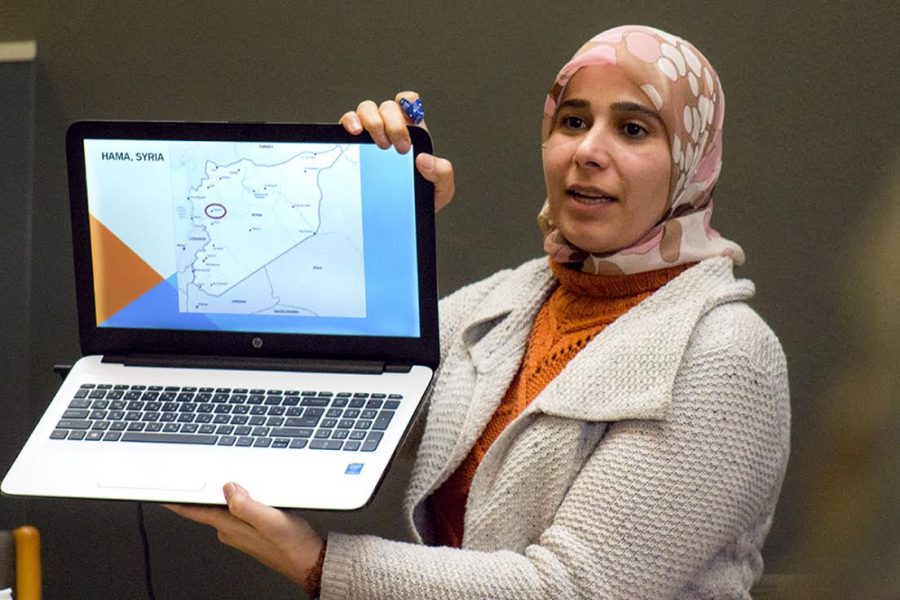Syrian Interfaith speaker reiterates importance of faith in the face of Syrian crisis
Ghada Ghazal spoke Thursday about Syrian conflict and why having faith is important during times of crisis
More stories from Rachyl Houterman
Photo by Rachyl Houterman
Ghada Ghazal talks about her personal experiences in Syria and her path to becoming an interfaith speaker with Eau Claire community members Thursday at the Ecumenical Religious Center.
In the midst of crisis, having faith in God can be difficult, but it is necessary, an interfaith speaker from Syria said during a presentation Thursday evening at the Ecumenical Religious Center (ERC) in Eau Claire.
“In these times, it’s so important to have deep faith in God and to try to stand for peace and to try to stand for justice and to try to help those in need,” said Ghada Ghazal, a Syrian interfaith educator who has traveled the world to educate people about Islam, women’s issues and the conflict in Syria.
Ghazal originates from Hama, Syria and has spent a portion of her life educating and informing people across the globe of her life in Syria and her confidence in God despite such difficulties in her home country.
Ghazal spoke for over an hour to a group of community members who gathered in the ERC to learn about the Syrian crisis and hear her message.
Ghazal’s presentation included background information on the history of Syria and the conflict leading up to her departure in 2012. She also talked about her life during that time and her determination to seek knowledge and educate others around the world about the Syrian conflict.
As life in Syria became increasingly unsettled, Ghazal said, attempts at peaceful demonstrations organized by the people resulted in injuries and loss of life following violent military intervention.
She said there had been marches organized, in which military snipers would shoot and kill a person in the crowd, and the demonstrators would then pick up the person’s body and continue marching.
“People start feeling this: Either we live a dignified life or we die. We don’t care,” Ghazal said. “Because you reach this stage where you cannot endure any more oppression.”
During this time, Ghazal was also pursuing her education. She graduated from college in 1999 with a degree in English Language Literature and English Literature. In 2003, she received a scholarship to travel to the United Kingdom to get her Master’s degree, something that concerned her family.
“It’s not usual for a girl to go alone to a foreign country without having relative or friends there,” Ghazal said. “They don’t speak the same language, different culture, different food and we have these stereotype ideas about the West. It’s all complicated.”
In 2005, she returned to Syria to teach at a local university. In 2006, Ghazal said she felt she had her first interfaith experience at the Islamic Studies Center of Damascus, where she worked with a group of religious and spiritual leaders. Following this, Ghazal was selected in 2007 to be a delegate to the U.S. as a member of the Religion and Society Program where she was able to learn about Islam and Christianity in the U.S.
She had an opportunity to return to the U.S. in 2009, but the Syrian government prevented it, and she instead obtained a work contract in Qatar, leaving Syria near the end of 2012. Ghazal has not been back to her home country since.
In 2016, Ghazal came to the U.S., where she now travels around the country educating people about Islam, the conflict in Syria, the refugee crisis and other related topics.
Bob Lesniewski, who organized Ghazal’s speaking opportunity, said listening to Ghazal’s story is personal for him. As a member of a Benedictine monastery, he said he’s asked to practice many values, including taking the opportunity to listen and learn from other people.
“The reason why we should be doing that is if we listen to people, we’ll have a better understanding,” Lesniewski said. “Hopefully we can start to knock down some of the barriers that are preventing us from having a peaceful world.”
Connie Russell, an Eau Claire resident, said she attended Ghazal’s presentation because she is interested in learning about the refugees “from a political perspective,” and she enjoys hearing from women who have unique experiences.
“It reiterated, to me, the complexity of the conflict in Syria and that part of the world and the challenges that people have to face on an individual basis.” Russell said. “It really personalizes the pain that families are facing. It’s really different than just reading an article on Facebook.”
Ghazal concluded her presentation by reinforcing the idea that people must have faith in God despite the crisis happening, believing it is an opportunity for people to show God their devotion to him.
“During all this process, what keeps me strong and optimistic is to have faith in God,” Ghazal said.“Crisis is a means for our journey and for our faith. It’s a test for us.”

